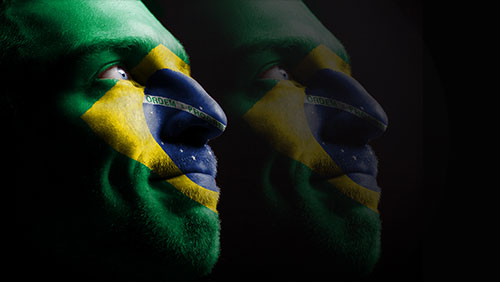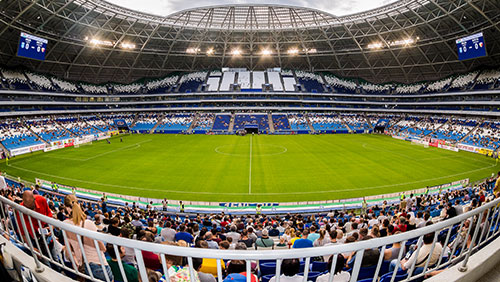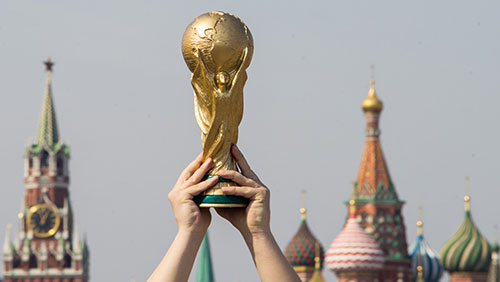Silky Brazil is the narrow betting favorite to win the World Cup soccer tournament that kicks-off Thursday in Moscow. In truth, any nation’s soccer fortune isn’t written in the odds, or the stars, but in the stats – the economic stats.
 Today, we release the 4th edition of the Democracy Institute’s econometric soccer rankings, a popular tool among gamblers and investors. DI’s predictive model had very successful runs at the 2014 and 2010 Worlds Cups and, most recently, during Euro 2016. Two years ago, DI’s rankings favored small, economically free nations such as Iceland, Wales, Northern Ireland, and Ireland. At the outset, each one was unfancied by bookmakers, ‘expert’ pundits, and conventional wisdom, yet on the pitch each one vastly exceeded expectations, with the Welsh making the semi-finals.
Today, we release the 4th edition of the Democracy Institute’s econometric soccer rankings, a popular tool among gamblers and investors. DI’s predictive model had very successful runs at the 2014 and 2010 Worlds Cups and, most recently, during Euro 2016. Two years ago, DI’s rankings favored small, economically free nations such as Iceland, Wales, Northern Ireland, and Ireland. At the outset, each one was unfancied by bookmakers, ‘expert’ pundits, and conventional wisdom, yet on the pitch each one vastly exceeded expectations, with the Welsh making the semi-finals.
DI’s 2018 World Cup rankings signal that Brazil, France, Spain, and Argentina are poised to under-achieve. And, look for Uruguay, Switzerland, England, Sweden, Iceland, Denmark, Morocco, and Australia to exceed expectations. Colombia and Russia may also surprise over the coming weeks.
For the World Cup, our analysis draws upon the data provided in the Heritage Foundation’s “2018 Index of Economic Freedom.”[1] For 24 years, the Index has measured the formidable positive relationship between economic freedom and social progress.
Good coaching, a talented squad, and some luck are necessary for victory in a major soccer tournament, but they are often insufficient to the task. When these necessary variables are synthesized with a weighted economic freedom variable, the subsequent DI rankings add some essential science to the art of soccer wagering.
Here’s DI’s group phase[2] breakdown of each nation’s likelihood of success:
Group A
Russia’s prospects rest with a very good goalkeeper, Igor Akinfeev, and a young starlet, attacking midfielder Aleksandr Golovin. To overcome their poor DI rank of 27th out of 32 World Cup teams, a moderately talented squad employing coach Stanislav Cherchesov’s defensive playing style will require all of the advantages provided by host nation status and the fuel of the country’s flat tax on income.
A tough Uruguayan team features a resilient defence, led by the outstanding Diego Godin, and an equally strong attack, spearheaded by Luis Suarez and Edinson Cavani. Oscar Tabarez, coaching Uruguay for his fourth World Cup, has added some promising youthful midfielders. Talent, grit, experience, and a DI rank of 10th suggest a team equipped to go surprisingly deep in the tournament.
If the spectacular Mohamed Salah isn’t fully recovered from the shoulder injury he suffered in the Champions League final, Egypt’s already limited hopes are doomed. There’s only so much that Hector Cuper, the excellent, defense-minded Argentine coach, can do with the rest of this star-less, 29th ranked squad weighed down by a government-dominated domestic economy.
The fabulously wealthy Saudi royal family has sent a team to Russia that looks quite poor. Juan Antonio Pizzi was named just last week as the new coach; there appears little he or star striker Mohammad Al-Sahlawi can do to overcome Saudi Arabia’s DI rank of 24th.
Group B
 “Spain’s a near-perfect blend of old and new players. A star-studded squad features goalkeeper David de Gea, midfielders David Silva and Andres Iniesta, and striker Diego Costa. Yet, all’s not well behind the scenes, with coach Julen Lopetegui fired on the eve of the tournament. His replacement, sporting director Fernando Hierro, still has delightful footballing ingredients at his disposal, but a mediocre DI rank of 17th may cause his team to go off the boil.”
“Spain’s a near-perfect blend of old and new players. A star-studded squad features goalkeeper David de Gea, midfielders David Silva and Andres Iniesta, and striker Diego Costa. Yet, all’s not well behind the scenes, with coach Julen Lopetegui fired on the eve of the tournament. His replacement, sporting director Fernando Hierro, still has delightful footballing ingredients at his disposal, but a mediocre DI rank of 17th may cause his team to go off the boil.”
Although tournament savvy, Euro 2016 winners Portugal are one of the oldest squads and dependent upon a single player, Cristiano Ronaldo. Since taking over the team in 2014, coach Fernando Santos has built a solid defensive shield, but one unlikely to overcome a lone-star system and a DI rank of only 20th.
Morocco is the best African team in the World Cup, well coached by Frenchman Hervé Renard, who won the African Cup of Nations with Zambia and Ivory Coast. He’s brought discipline to a team developing an exciting brand of football based on Medhi Benatia’s solid defending and a fast tempo attack featuring Nabil Dirar. Ranked a competitive (in this group) 22nd by DI, Morocco may surprise an opponent or two.
A cohesive, hard working team led by the free-scoring Sardar Azmoun, Iran is fortunate to be coached by the vastly experienced and well-travelled Carlos Queiroz. But, a last place (32nd) DI ranking underlines their limited prospects.
Group C
On paper, France’s the best, most eye-catching squad in the tournament, with enormous depth and incredible pace upfront. A vibrant side sporting Antoine Griezmann, Paul Pogba, and Kylian Mbappe should be a coach’s dream. But, can Didier Deschamps, who has made poor decisions in past tournaments, select the right team for each match? Worry over the coach, in tandem with DI’s 19th ranking, may see the French fall short.
Australia’s an older, unfancied team with an interim coach. Nevertheless, English league veterans Mile Jedinak and Tim Cahill will deploy an attacking style touted as the “Australian Way.” A strong economy’s also the Australian way, and the nation’s 2nd best DI ranking could see the Socceroos posing serious questions of their opponents.
Denmark may be the thinking fan’s Australia. The Danish players are mostly unknown, very physical, and supremely well-organized by their Norwegian coach Åge Hareide. With playmaker Christian Eriksen at the peak of his powers, and teammates who are very strong in the air, the Danes’ DI ranking of 5th -best team could see them secure a serious scalp or two over the next few weeks.
At their first World Cup since 1982, Peru’s an improving team anchored by Mexico-based players. The key exception is Brazil-based striker Paulo Guerrero. In tandem with a DI rank of 12th, coach Ricardo Gareca’s noted organizational acumen could produce one or two surprisingly competitive group matches.
Group D
A lopsided Argentinian team possesses incredible attacking depth (Lionel Messi, Sergio Aguero, Gonzalo Higuain) that must compensate for a suspect defense. Although he’s one of the world’s best coaches, Jorge Sampaoli’s pressing style (so successful with Chile in 2014) doesn’t quite fit this team. Such imbalances married to a very poor DI ranking (30th) mean Argentina must overcome major obstacles to repeat as a finalist.
The smallest country ever in a World Cup, Iceland still displays the determined, effective, efficient style that stole so many headlines when she reached the quarterfinals of Euro 2016. Coach Heimir Hallgrimsson has gritty Aron Gunnarsson and creative Gylfi Sigurdsson at his disposal. As importantly, Iceland has DI’s 4th highest ranking. Iceland may be the surprise package of a very tough group.
Boasting one of the best midfields at the World Cup, the Croatians are technically very strong. Led by playmaker Luka Modric, alongside midfielders Ivan Rakitic and Ivan Perisic and forward Mario Mandzukic, Croatia are on paper a tough team to beat. Yet, their tournament ceiling is signaled by their DI rank of just 23rd.
Nigeria is the tournament’s youngest team and exhibits the refreshing fearlessness of youth. Married to the experience of John Obi Mikel and Victor Moses, the Super Eagles won’t be pushovers, but ultimately will be weighed down by their DI rank of 26th.
Group E
Brazil sports superior talent at most positions. Overhauled by coach Adenor “Tite” Bacchi, this team’s better than the one embarrassed by Germany in the 2014 semifinal. Tite has found the right balance between attack and defence. Brazil’s well-organized and playing with flair; in soccer terms, that’s normally a lethal combination. But, ranked a lowly 31st in economic terms, Brazil may be upset in the latter stages.
Always overlooked, the Swiss nearly always exceed expectations. Switzerland’s a well-balanced, cohesive team that’s greater than the sum of its parts. Those parts, headlined by the mercurial Xherdan Shaqiri, Granit Xhaka’s passing, and veteran Stephan Lichtsteiner’s tough defending, have been artfully molded by unheralded Bosnian coach Vladimir Petkovic. Petkovic’s tournament nous and Switzerland’s 1st place DI rank may guide them to another surprising appearance in the knock out phase.
Conventional wisdom expects Serbia to finish as group runners-up. The team’s defensively robust (see Branislav Ivanovic and Nemanja Matic) and skillful (see Aleksandar Mitrovic and Sergej Milinkovic-Savic). In a highly competitive group, can their natural talent overcome their 21st-place DI ranking? Probably not.
Tiny Costa Rica reached the quarterfinals of the last World Cup, losing to the Netherlands on a penalty shootout. That surprise was based around striker Bryan Ruiz, goalkeeper Keylor Navas, and a stubborn, unyielding playing style. It was also powered by a strong, market-oriented economy. All these factors are again at play, with DI’s 16th ranked team quite capable of causing awkward moments for more heralded opponents.
Group F
Germany coach Joachim Löw’s initiated a generational shift that sprinkles talented “young guns” amidst the core of the squad that triumphed in Brazil. Led by midfield maestros Toni Kroos and Mesut Özil, and powered by DI’s 7th-best ranking, it’ll be hard to stop such a talented, disciplined team from repeating as champions.
At the World Cup, Mexico’s always good, but never great. Hence, they’ve reached, but been eliminated in, the Round of 16 for six tournaments in a row. In Javier Hernandez and Giovanni dos Santos, Mexico has firepower to fuel coach Juan Carlos Osorio’s attacking style. Known for detailed tactical planning, Osorio’s always changing formations and personnel. Can he maneuver his pieces well enough to overcome DI’s mediocre 18th ranking? It’s unlikely.
Absent its iconic superstar, Zlatan Ibrahimovic, Sweden’s flying under the radar. But this underrated, united, workmanlike team will be a tough out. Following Euro 2016, coach Janne Andersson built a defensive, counterattacking team greater than the sum of its parts. Emil Forsberg has replaced Ibrahimovic as Sweden’s inspiration in attack and could contribute disproportionately to a surprisingly good run for DI’s 6th ranked team.
South Korea is economically impressive, but is much thinner on physical talent than the Swedes. Although boasting the skillful attacker Son Heung-min, it’s unlikely that South Korea’s stellar (8th) DI ranking can overcome its inherent weaknesses.
Group G
The English team’s often less than the sum of its parts. Carrying only modest expectations, this team may actually over-achieve. Collating the third youngest squad, tactically savvy coach Gareth Southgate has selected fast, technical, and versatile players to support world class striker Harry Kane. The lack of a creative talisman is the team’s obvious Achilles heel, yet a 3rd place DI ranking could propel England to upset a more fancied team during the knockout stages.
Will Belgium also be less than the sum of its parts? Spanish coach Roberto Martinez is under pressure to maximize the exceptional talent of the country’s “golden generation.” With striker Romelu Lukaku supported by creative geniuses Eden Hazard and Kevin De Bruyne, this team should scare everyone. Less scary is the team’s middling (14th) DI rank. Another disappointing Round of 16 or quarterfinal exit beckons.
Tunisia’s a skillful team that lacks depth and sufficient support for forward Youssef Msakni. Carrying the baggage of DI’s 25th ranking, it’ll be very difficult for coach Nabil Maaloul to overcome any of the Eagles of Carthage’s group opponents,.
Panama’s defensive, long-ball team carries a passionate spirit epitomized by striker Luis Tejada. Colombian coach Hernán Darío Gómez got his native country into the 1998 World Cup, then did the same for Ecuador in 2002. He now has Panama in its first World Cup. His experience and a respectable (15th) DI ranking may see the Panamanians edge Tunisia for third place.
Group H
After upsetting conventional wisdom in 2014, Colombia may be the strongest team in this highly competitive group. With talisman James Rodriguez and veteran striker Radamel Falcao at his disposal, coach Jose Pekerman should ride a talented team and an 11th place DI ranking into the Round of 16, at least.
Poland should also make the Round of 16 thanks to striker Robert Lewandowski’s goals. No longer a counter-attacking team, coach Adam Nawalka now seeks to dominate possession. A solid (13th) DI ranking makes a successful tactical transition more likely.
Japan lacks star power, but does possess considerable European experience courtesy of Shinji Kagawa and Shinji Okazaki. Can Bosnian coach Vahid Halilhodzic replicate his success at the last World Cup when he took Algeria into the Round of 16? Despite the aid provided by DI’s 9th-best ranking, that’s clearly a long shot.
Senegal may be the most overrated team in Russia. They do possess a strong core, with world class defender Kalidou Koulibaly and the speedy winger Sadio Mané. But the drop-off from those two stalwarts is considerable, and it’s propelled downwards by a terrible (28th) DI ranking.
Over the past decade, global economic data has consistently told us that, while governments pour taxpayer money into their national soccer programs, a healthy dose of the free market would better prepare teams to meet or exceed their respective World Cup expectations. In Russia, the trend looks set to continue.
Patrick Basham is director of the Democracy Institute and is a Cato Institute adjunct scholar.
[1] The Index evaluates countries in four broad policy areas that affect economic freedom: rule of law; government size; regulatory efficiency; and open markets. There are 12 specific categories: property rights, judicial effectiveness, government integrity, tax burden, government spending, fiscal health, business freedom, labor freedom, monetary freedom, trade freedom, investment freedom, and financial freedom. Scores in these categories are averaged to create an overall score. See Terry Miller, Anthony B Kim, and James M Roberts (eds), “2018 Index of Economic Freedom,” Heritage Foundation: Washington DC, February 2018, https://www.heritage.org/international-economies/commentary/2018-index-economic-freedom.
[2] The month-long tournament features a group phase of round-robin games between the four teams within each of the eight groups. Each group’s top two teams enter the first knockout phase (“Round of 16”). The Round of 16 is followed by an eight team quarterfinal stage, and then a “Final Four”-style semi-final round with the winner decided in the final played in Moscow on July 15th.
